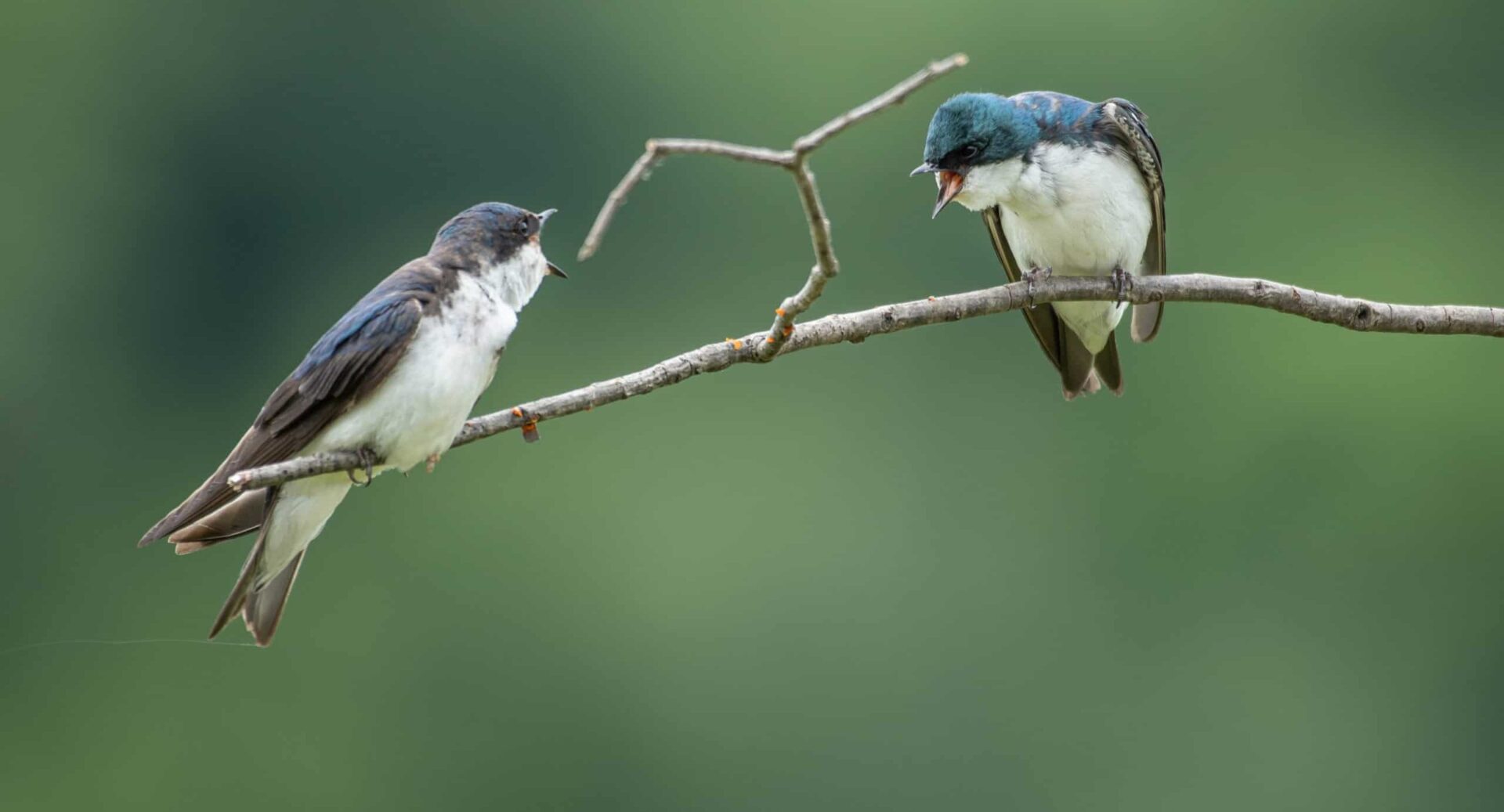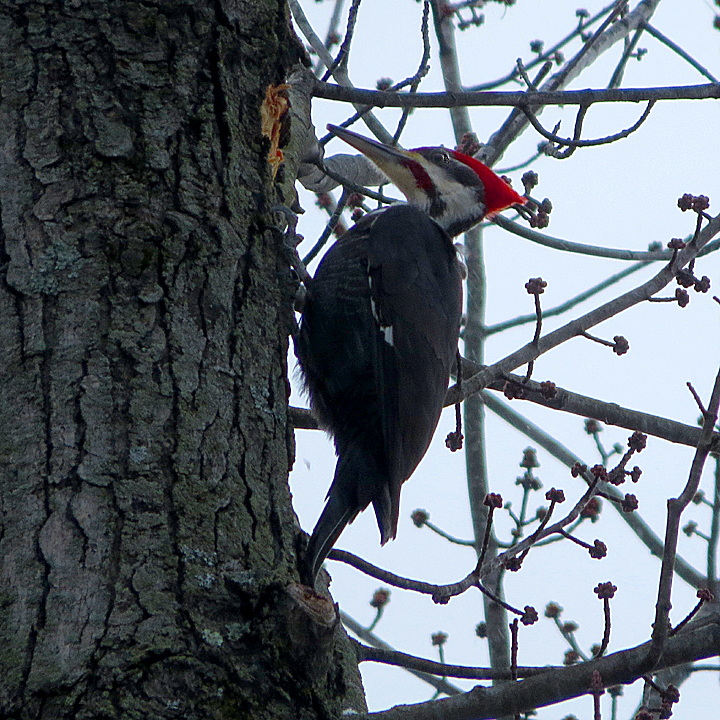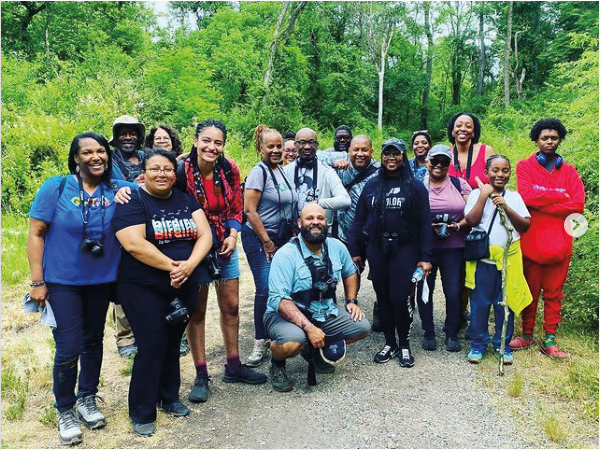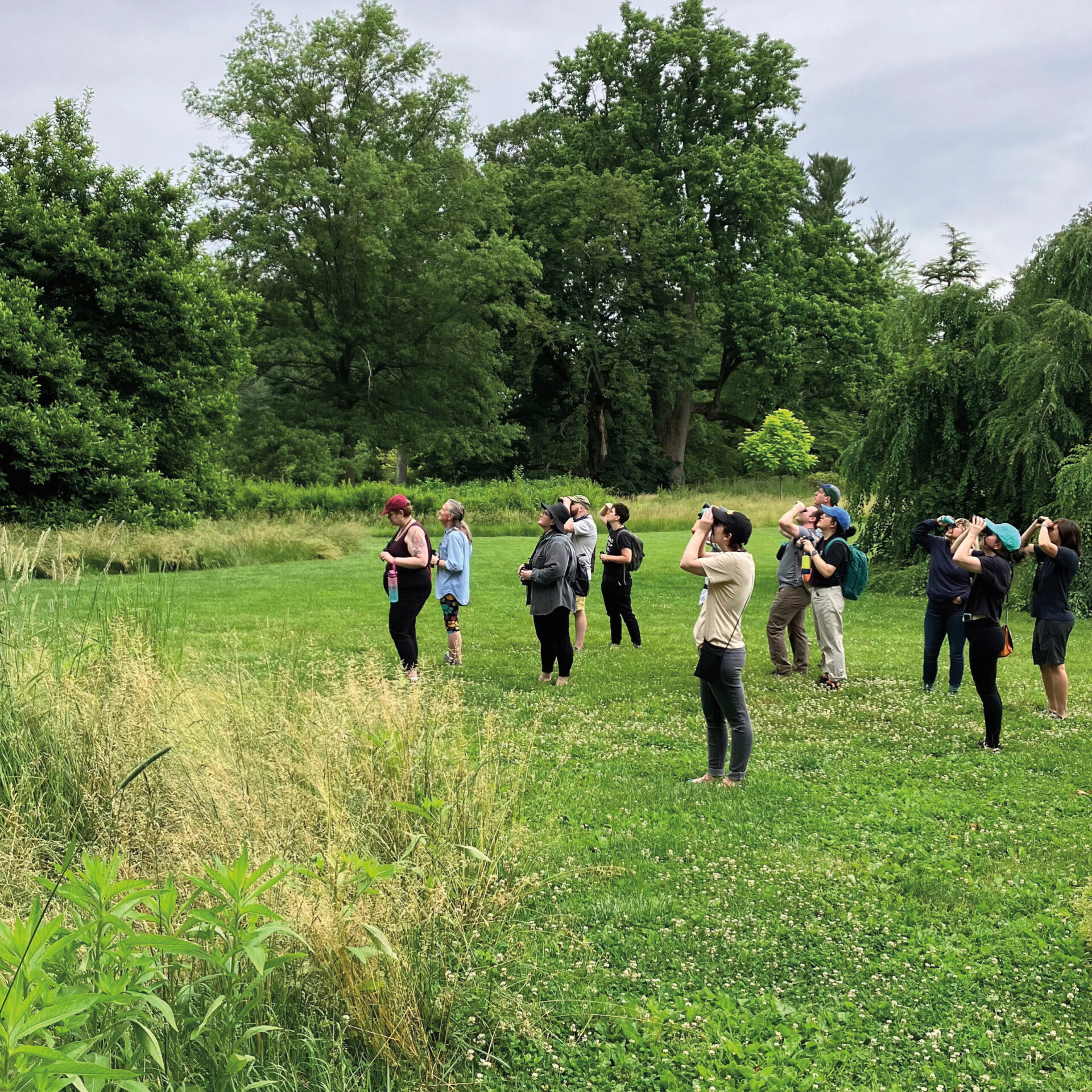Bird Brained.
January 22, 2024
A woman looking through binoculars.
“I’ve had this recurring dream that I can fly,” says Mike Niven. “In my dreams, I run, take a leap, and I’m flying. When I was a teenager, I got really into flying gliders. I guess it makes sense that I’ve become fascinated with birds.”
Mike is among the 45 million bird-watchers—also known as birders—in America, according to the U.S. Fish and Wildlife Service. Their interests range from casual observation at a backyard bird feeder to a passion that propels them around the globe in search of new species to add to their “life lists.”
It wasn’t until he retired a few years ago that Mike’s interest in birds deepened. A dedicated Natural Lands Force of Nature® volunteer, Mike makes time to birdwatch daily, taking longer excursions at ChesLen or Sadsbury Woods Preserves at least three days a week.
“I remember watching a Barn Swallow in my yard and I started thinking about how incredible it is that that tiny bird can fly almost 7,000 miles from South America to my house in Pennsylvania. My interest grew from there.”
Scientists are taking a closer look at the benefits of birding to human health. Beyond the physical exercise that accompanies the hobby, research shows that birdwatching can change our brains and improve our mental wellbeing.
avian attitude.
While numerous studies have shown the benefits of nature on mood, new research suggests there may be something particularly healthy about birds in particular. Two studies published last year in Scientific Reports found that seeing or hearing bird songs improved mental well-being.

Photo by Randy Richard
In one study, researchers asked participants to record information about their environment and well-being three times a day using a smartphone app. In analyzing their logs, researchers found a significant positive association between seeing or hearing birds and improved mental well-being, sometimes even hours after the bird encounter. The benefits weren’t explained by other environmental factors, like seeing trees, plants, or water, all of which the study controlled for.
One of the study’s authors, Andrea Mechelli, said he was searching for answers to why city dwellers may be more prone to mental illness. “I don’t have a particular agenda focused on nature myself. I wasn’t thinking we were going to demonstrate nature has a strong effect,” Mechelli told National Geographic.
A second study found that listening to audio clips of birdsong reduced feelings of anxiety, depression, and paranoia in healthy participants.
Another study, published in 2020 in Ecological Economics, showed a correlation between happiness and the number of bird species around people’s homes and towns. Researchers concluded that being near 14 additional bird species was as satisfying as earning an extra $150 per month.
Scientists have two main theories for why nature may sooth us. The first is that homo sapiens evolved in nature and thus urban environments are jarring to our very beings. The second theory is called attention restoration theory. Like the first, it postulates that modern daily life requires intense focus. Nature allows us to disengage that focus and engage in a sort of open-eyed meditation.
Mike Niven can relate. “Birding allows me to be in the present moment,” he says. “When I’m outside with my binoculars or even just listening to birdsong while I’m weeding my garden, I’m immersed in it. Everything slows way down.”
this is your brain on birds.
Another study published last year suggests the effects of birding go beyond mood and may even boost cognitive ability.
Aptly named researcher Erik Wing and his colleagues asked birders of varying experience levels to arrange bird images according to perceived similarity. Experts tended to group birds based on specific features, such as tail or beak shape. In contrast, non-experts more often based their grouping on superficial features like color.

Photo by Carole Mebus
Next, the researchers tested participants’ memories. First, they showed them a series of bird photographs. Next, they showed them a second series containing both novel and repeated species and asked participants if they had already seen each bird in the first series of photographs. The researchers found that those who grouped birds based on specific features performed better in the memory task than those who grouped birds based on color.
Wing concluded that long-term knowledge of avian species helped people remember new birds more easily, and that gaining deep expertise in a subject area can change mental “scaffolding,” literally rewiring the brain.
Natural Lands volunteer Mike Niven likes the idea of birds helping his memory, mood, and mind. He feels birds have enriched people’s lives—including their physical and mental health—so much, he hopes humans can return the favor.
“As I’ve gotten more involved in birding and volunteering with Natural Lands, I find myself focusing on habitats. Without supportive habitats—meadows, forests, wetlands—we’re not going to have birds. So we all have to do what we can to save and care for nature. After all, what will we do with our stress if the birds go away?”
birding opportunities abound.
Want to boost your mood and improve memory? Thankfully, birds are everywhere from bustling city parks to rural nature preserves.
“Anyone can become a birder just by taking note of what they see and hear around them,” says Debbie
Beer, Natural Lands’ director of volunteers and avid birdwatcher. “You don’t even need fancy equipment,
just a little time and curiosity. Exploring nature with more experienced birders can be a great way to learn.”
Natural Lands offers about 20 bird-related events every year. Visit natlands.org/events to explore
our current offerings.
bonding over birds.
In addition to improving physical health and mental well-being, birding can create community. While bird clubs have been around for a century, in recent years, there has been a rise in birdwatching groups aiming to empower people who may not feel safe or welcome in all outdoor spaces. Here are a few we love.
-

Photo courtesy of Mike Fernandez, Birdability
Birdability works to ensure the birding community and the outdoors are welcoming, inclusive, safe and accessible for everybody. The organization focuses on people with mobility challenges; blindness or low vision; chronic illness; intellectual or developmental disabilities; mental illness; and those who are neurodivergent, deaf, or hard-of-hearing or who have other health concerns. Birdability has partnered with the National Audubon Society to create a crowdsourced map that describes in detail the accessibility features of birding locations all over the world. birdability.org
-

Photo courtesy of InColorBirding
Founded in 2021 in Philadelphia, In Color Birding Club aims to make the birding experience a positive one for BIPOC (Black, Indigenous, and People of Color) folks and their allies. Working with existing birding venues and locations, In Color Birding brings BIPOC voices into those traditional places. They also venture into new spaces that have been historically underserved with eyes to the skies. In particular, the non-profit organization strives to inspire youth. “We must first acknowledge how we got here, then create a physical, mental, and emotional pathway for our youth to thrive outdoors.” said Jason Hall, founder and board member. incolorbirding.org
-

Photo courtesy of Philly Queer Birders
Philly Queer Birders also began in 2021 to create community among LGBTQIA+ birders. They meet up monthly for explorations of the great birding the Philadelphia region has to offer. Said founder Elise Greenberg, “We welcome all birders who align with our values and seek to center the experiences and knowledge of queer people.” Philly Queer Birders also offers resources and articles on their website, including “Nine Great Spots for Bird-Watching in Philly and the ‘Burbs.” phillyqueerbirders.com
next post
Snow Day
January 16, 2024
By Daniel Barringer, Preserve Manager. A snow day means different things to different people. I’m currently in the camp of “those who have to clear […]
continue reading